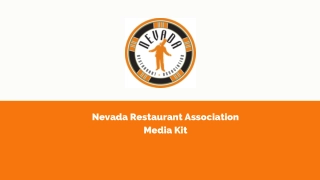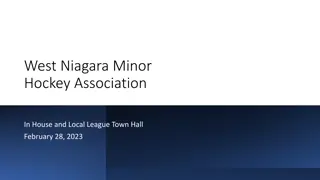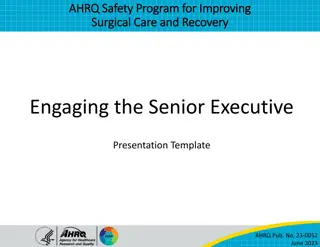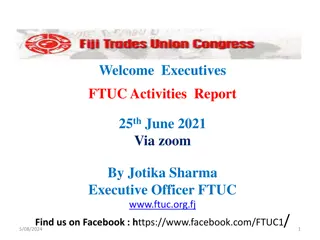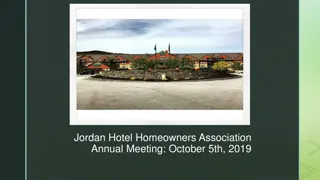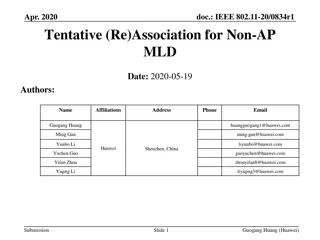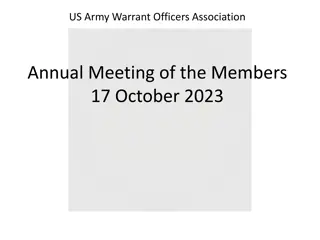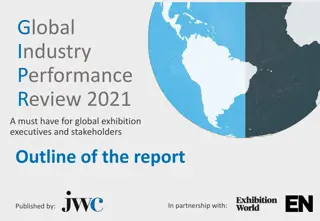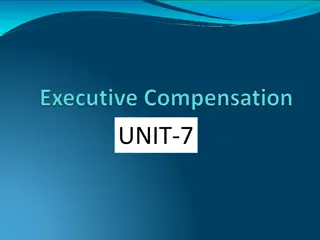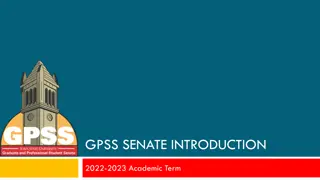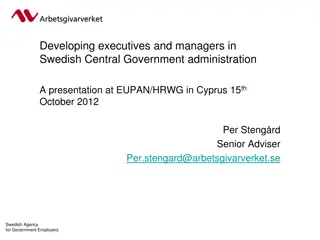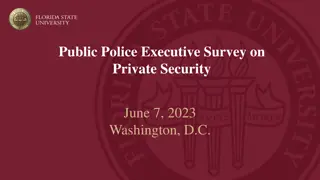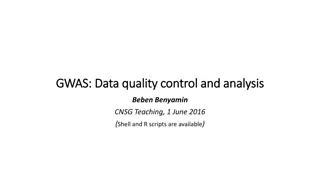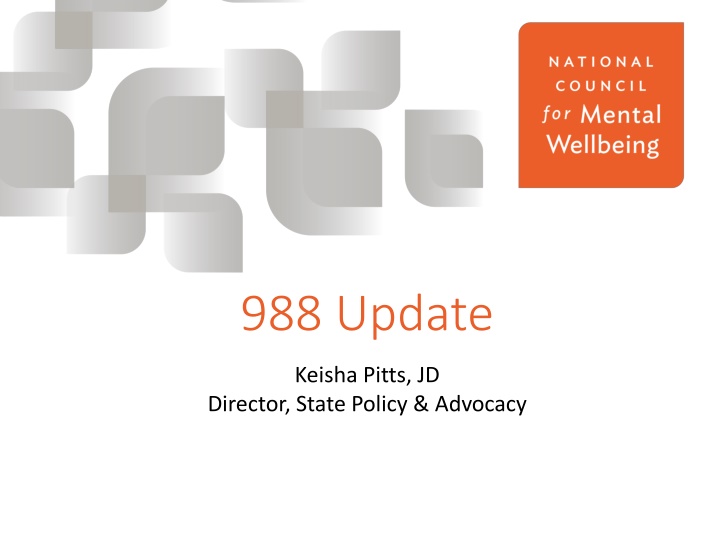
Federal Funding Updates for Crisis Intervention and 988 Implementation
Explore the latest federal funding initiatives supporting crisis intervention and the 988 implementation, including grant awards and cooperative agreements to enhance response capabilities. Learn about SAMHSA grants, CMS planning grants, and efforts to improve statewide crisis contact responses.
Download Presentation

Please find below an Image/Link to download the presentation.
The content on the website is provided AS IS for your information and personal use only. It may not be sold, licensed, or shared on other websites without obtaining consent from the author. If you encounter any issues during the download, it is possible that the publisher has removed the file from their server.
You are allowed to download the files provided on this website for personal or commercial use, subject to the condition that they are used lawfully. All files are the property of their respective owners.
The content on the website is provided AS IS for your information and personal use only. It may not be sold, licensed, or shared on other websites without obtaining consent from the author.
E N D
Presentation Transcript
988 Update Keisha Pitts, JD Director, State Policy & Advocacy
Federal Updates Current Federal Funding SAMHSA Grant Award for 988 Launch and Operations $152M total over 2 years $105M total over 2 years; SAMHSA Cooperative Agreements for States and Territories to Build Local 988 Capacity awarded $250K to $14.5M each to all states and territories $15M total to 20 states CMS Mobile Crisis Intervention State Planning Grants (American Rescue Plan) (AL, CA, CO, DE, KY, MA, MD, ME, MO, MT, NC, NM, NV, OK, OR, PA, UT, VT, WI, WV) Community-Based Mobile Crisis Intervention Services (Medicaid Federal Medical Assistance Percentage) 5 year plan; 85% FMAP for state Medicaid programs
Current Federal Funding SAMHSA Grant Award for 988 Launch and Operations Expand workforce and infrastructure for the National Suicide Prevention Lifeline's national backup centers, text/chat centers, Spanish language centers, and specialized services for high-risk populations Establish local collaborations with 911 (PSAPs) and mobile crisis response stakeholders, building and maintaining national databases of local resources, create and implement protocols for national centers' coordination of community dispatch for local crisis outreach and emergency services Cooperative Agreements for States and Territories to Build Local 988 Capacity Improve 988 response by: Recruiting, hiring and training local 988/Lifeline centers workforce Unifying 988 response by Lifeline crisis centers across states/territories Expanding the crisis center staffing and response structure needed for the successful implementation of 988 Expectations for grantees: Ensure all calls originating in a state/territory first route to a local, regional and/or statewide Lifeline crisis call center Improve state/territory response rates to meet minimum key performance indicators Increase state/territory support capacity to meet 988 crisis contact demand
Current Federal Funding (cont.) CMS Mobile Crisis Intervention State Planning Grants State Medicaid agencies will: Assess community needs and develop programs for community crisis intervention services Integrate community-based mobile crisis intervention services into their Medicaid programs FMAP for Community-Based Mobile Crisis Intervention Services Components: Regional or statewide crisis call centers coordinating in real time Centrally deployed, multi-disciplinary 24/7 mobile crisis teams 23-hour crisis receiving and stabilization programs Enhances training, transportation options, and telehealth Highlights role of CCBHCs in Crisis systems
Introduced Funding 988 Implementation Act of 2022 (H.R.7116) 988 and Parity Assistance Act of 2022 (H.R.7232) Authorizes grant funding dedicated to states for implementation of mental health and substance use parity enforcement Dedicates resources for regional and local call centers, mobile crisis response teams and crisis centers Invests in crisis workforce development through training and scholarship opportunities Provides for technical assistance to states to implement 9-8-8 and capital development grants for crisis programs and call centers Creates in an awareness campaign to ensure Americans know that 9-8-8 is available Establishes standards for the crisis care continuum Expands the existing ten state Certified Community Behavioral Health Centers (CCBHC) demonstration to permit any state to participate through Medicaid Dedicates resources to support local and regional call centers, mobile crisis response teams and crisis centers Invests in crisis workforce development through training and scholarship opportunities Provides for technical assistance to states to implement 9-8-8 and capital development grants for crisis programs and call centers Creates a campaign to ensure Americans know that 9-8-8 is available Requires all health insurance plans to cover crisis services Establishes standards for the crisis care continuum
State Updates 12 states passed 988 legislation that included funding (CA, CT, ID, IL, KS, LA, MD, MS, NM, NY, OR, WV) 4 states passed 988 legislation that includes a telecom fee (CO, NV, VA, WA) 5 states passed 988 study or trust fund bills (AL, IN, NE, TX, UT) 7 states have legislation pending (CA, MI, MO, NJ, OH, SC, MA) 7 states had legislation that failed (FL, HI, KY, MN, MT, RI, VT) 13 states have not taken any legislative action to support 988 implementation
How States Can Build CCBHCs into 988 Implementation 1 2 3 CCBHCs as 988 call centers CCBHCs as providers of crisis CCBHCs as referral support services not partners for post-crisis or provided by 988 call centers non-urgent needs
CCBHCs participating in the Suicide Prevention Lifeline Network 1. 2. 3. 4. 5. 6. 7. 8. 9. 10. The Nord Center, Lorain, OH 11. Family and Children s Services, Inc., Tulsa, OK 12. Centerstone of Tennessee, Nashville, TN 13. Integral Care, Austin, TX 14. Emergence Health Network, El Paso, TX 15. MHMR of Tarrant County, Fort Worth, TX 16. Harris Center, Houston, TX Guam Behavioral Health and Wellness Center, Tamuing, GU COMCARE of Sedwick County, Wichita, KS Mountain Comprehensive Care Center, Prestonburg, KY Seven Counties Louisville, KY Macomb County Community Mental Health, Clinton Township, MI Network 180, Grand Rapids, MI Compass Health, Clinton MO Western Montana Mental Health, Missoula, MT Rutgers University Behavioral Health Care, Piscataway Township, NJ
FCC Geolocation Forum Calls will be routed based on the caller s area code Concern: area codes often do not match the caller s physical location Many stakeholders acknowledged that geolocation can save lives Concerns: Forced and unwanted interventions Legal/political risks, ie. trans youth callers parents reported to state agency, undocumented immigrants, etc. Historical biases affecting specific communities Options presented: Disclose that calls will be traced Caller consent Only use geolocation on specific calls or limit access to the data Recommended Next Steps: Convene multi-stakeholder advisory committee per FCC 988 Geolocation Report recommendation
988 Implementation Guidance Playbooks SAMHSA, in co-sponsorship with NASMHPD, worked with National Council and other national partners across critical working sectors involved with 988 to develop 988 Implementation Guidance Playbooks. Available at NASMHPD website: https://www.nasmhpd.org/content/988-implementation-guidance-playbooks State, Territories & Tribes(link is external) Mental Health and Substance Use Disorder Providers(link is external) Lifeline Contact Centers(link is external) Public Safety Answering Points (PSAPs)


